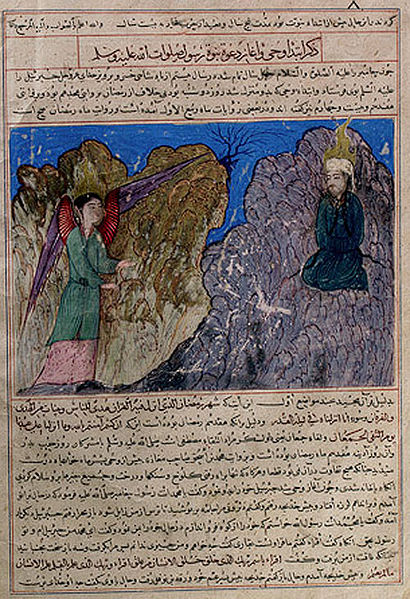Mohammed’s Call to Prophecy and the First Revelation; leaf from a copy of the Majmac al-tawarikhTimurid. From Herat, Afghanistan. In The Metropolitan Museum of Art, ca. 1425
On this date in 622 Mohammed completed his hijra from Mecca to Medina.
Frye in notebook 11f:
Still with the Koran: it’s a perfect example of my concern and imagination thesis. Mohammed was a very great inspired poet, but he found that this quality was precisely what made him distrusted. So he insisted that he wasn’t a poet but a prophet, & started brainwashing his followers with interminable repetitions of the just-you-wait type. Islamic culture, Sufi mysticism, geometrical art, mathematics & the like, descend from the suppressed poet; Islamic fanaticism descends from the paranoid prophet. Yet, human nature being what it is, there would never have been any Islamic culture without the brainwashing paranoia. Ugh. But I think we’re finding the moral equivalent of war [para. 78, p. 87] and the next thing to find is the moral equivalent of concerned paranoia. One element of this is counter-prophecy, of the sort Blake describes in his Watson-Paine notes. A prophecy that, without being facile or “optimistic,” points out the positive opportunities in each situation. (CW 13, 88)


What is also helpful to me is:
“[The] Point in the humanism essay [The Critical Path]: a large part of humanism consists in comparative mythology. And all good mythographers have two characteristics: one, they sound like cranks or nuts (not typical of the humanist pose, of course); two, they show a great respect for the “wisdom of the ancients.” This is in contrast to the pseudo-Darwinian
“rational” views of history, which want to make man as apelike as possible, as recently as possible [see, CP, CW, vol. 27, 57-58; 1971, 85-6] All gradualist, or sham evolutionary theories of progress, whether bourgeois or Marxist in their setting, are imperialistic theories.